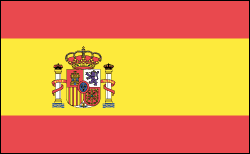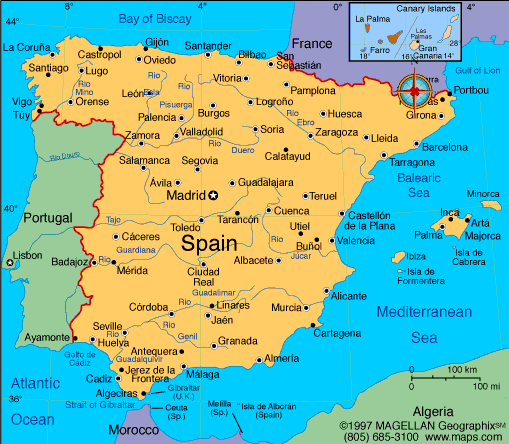SPAIN

Geography:Spain occupies 85% of the Iberian Peninsula, which it shares with Portugal, in southwest Europe. Africa is less than 10 mi (16 km) south at the Strait of Gibraltar. A broad central plateau slopes to the south and east, crossed by a series of mountain ranges and river valleys. Principal rivers are the Ebro in the northeast, the Tajo in the central region, and the Guadalquivir in the south. Off Spain's east coast in the Mediterranean are the Balearic Islands (1,936 sq mi; 5,014 sq km), the largest of which is Majorca. Sixty mi (97 km) west of Africa are the Canary Islands (2,808 sq mi; 7,273 sq km).
Government: Parliamentary monarchy.
History: Spain, originally inhabited by Celts, Iberians, and Basques, became a part of the Roman Empire in 206 B.C. , when it was conquered by Scipio Africanus. In A.D. 412, the barbarian Visigothic leader Ataulf crossed the Pyrenees and ruled Spain, first in the name of the Roman emperor and then independently. In 711, the Muslims under Tariq entered Spain from Africa and within a few years completed the subjugation of the country. In 732, the Franks, led by Charles Martel, defeated the Muslims near Poitiers, thus preventing the further expansion of Islam in southern Europe. Internal dissension of Spanish Islam invited a steady Christian conquest from the north.
Aragon and Castile were the most important Spanish states from the 12th to the 15th century, consolidated by the marriage of Ferdinand II and Isabella I in 1469. In 1478, they established the Inquisition, to root out heresy and uncover Jews and Muslims who had not sincerely converted to Christianity. Torquemada, the most notorious of the grand inquisitors, epitomized the Inquisition's harshness and cruelty. The last Muslim stronghold, Granada, was captured in 1492. Roman Catholicism was established as the official state religion and most Jews (1492) and Muslims (1502) were expelled. In the era of exploration, discovery, and colonization, Spain amassed tremendous wealth and a vast colonial empire through the conquest of Mexico by Cortés (1519–1521) and Peru by Pizarro (1532–1533). The Spanish Hapsburg monarchy became for a time the most powerful in the world. In 1588, Philip II sent his invincible Armada to invade England, but its destruction cost Spain its supremacy on the seas and paved the way for England's colonization of America. Spain then sank rapidly to the status of a second-rate power under the rule of weak Hapsburg kings, and it never again played a major role in European politics. The War of the Spanish Succession (1701–1714) resulted in Spain's loss of Belgium, Luxembourg, Milan, Sardinia, and Naples. Its colonial empire in the Americas and the Philippines vanished in wars and revolutions during the 18th and 19th centuries.
In World War I, Spain maintained a position of neutrality. In 1923, Gen. Miguel Primo de Rivera became dictator. In 1930, King Alfonso XIII revoked the dictatorship, but a strong antimonarchist and republican movement led to his leaving Spain in 1931. The new constitution declared Spain a workers' republic, broke up the large estates, separated church and state, and secularized the schools. The elections held in 1936 returned a strong Popular Front majority, with Manuel Azaña as president.
Government: Parliamentary monarchy.
History: Spain, originally inhabited by Celts, Iberians, and Basques, became a part of the Roman Empire in 206 B.C. , when it was conquered by Scipio Africanus. In A.D. 412, the barbarian Visigothic leader Ataulf crossed the Pyrenees and ruled Spain, first in the name of the Roman emperor and then independently. In 711, the Muslims under Tariq entered Spain from Africa and within a few years completed the subjugation of the country. In 732, the Franks, led by Charles Martel, defeated the Muslims near Poitiers, thus preventing the further expansion of Islam in southern Europe. Internal dissension of Spanish Islam invited a steady Christian conquest from the north.
Aragon and Castile were the most important Spanish states from the 12th to the 15th century, consolidated by the marriage of Ferdinand II and Isabella I in 1469. In 1478, they established the Inquisition, to root out heresy and uncover Jews and Muslims who had not sincerely converted to Christianity. Torquemada, the most notorious of the grand inquisitors, epitomized the Inquisition's harshness and cruelty. The last Muslim stronghold, Granada, was captured in 1492. Roman Catholicism was established as the official state religion and most Jews (1492) and Muslims (1502) were expelled. In the era of exploration, discovery, and colonization, Spain amassed tremendous wealth and a vast colonial empire through the conquest of Mexico by Cortés (1519–1521) and Peru by Pizarro (1532–1533). The Spanish Hapsburg monarchy became for a time the most powerful in the world. In 1588, Philip II sent his invincible Armada to invade England, but its destruction cost Spain its supremacy on the seas and paved the way for England's colonization of America. Spain then sank rapidly to the status of a second-rate power under the rule of weak Hapsburg kings, and it never again played a major role in European politics. The War of the Spanish Succession (1701–1714) resulted in Spain's loss of Belgium, Luxembourg, Milan, Sardinia, and Naples. Its colonial empire in the Americas and the Philippines vanished in wars and revolutions during the 18th and 19th centuries.
In World War I, Spain maintained a position of neutrality. In 1923, Gen. Miguel Primo de Rivera became dictator. In 1930, King Alfonso XIII revoked the dictatorship, but a strong antimonarchist and republican movement led to his leaving Spain in 1931. The new constitution declared Spain a workers' republic, broke up the large estates, separated church and state, and secularized the schools. The elections held in 1936 returned a strong Popular Front majority, with Manuel Azaña as president.

Map of Spain
Ruler: King Felipe VI (2014)
Prime Minister: Mariano Rajoy (2011)
Land area: 192,819 sq mi (499,401 sq km);
total area: 194,896 sq mi (504,782 sq km)1
Population (2014
est.): 47,737,941 (growth rate: 0.81%); birth rate: 9.88/1000;
infant mortality rate: 3.33/1000; life expectancy: 81.47; density per sq
mi: 240
Capital and largest city (2011 est.):
Madrid, 6.574 million
Other large cities:
Barcelona, 5.57 million; Valencia, 797,000
Monetary unit: Euro (formerly peseta)
National
name: Reino de España
Languages:
Castilian Spanish 74% (official nationwide);
Catalan 17%, Galician 7%, Basque 2% (each official regionally)
Ethnicity/race:
composite of Mediterranean and Nordic
types
Religions:
Roman Catholic 94%, other 6%
Literacy rate: 97.7% (2010 est.)
Economic summary: GDP/PPP (2013 est.):
$1.389 trillion; per capita $30,100. Real growth rate: -1.3%.
Inflation: 1.8%. Unemployment: 26.3%. Arable land:
24.75%. Agriculture: grain, vegetables, olives, wine grapes,
sugar beets, citrus; beef, pork, poultry, dairy products; fish.
Labor force: 23.2 million (2013 est.); agriculture 4.2%, manufacturing,
mining, and construction 24%, services 71.7% (2009 est.).
Industries: textiles and apparel (including footwear), food and
beverages, metals and metal manufactures, chemicals, shipbuilding,
automobiles, machine tools, tourism, clay and refractory products,
footwear, pharmaceuticals, medical equipment. Natural resources:
coal, lignite, iron ore, copper, lead, zinc, uranium,
tungsten, mercury, pyrites, magnesite, fluorspar, gypsum, sepiolite,
kaolin, potash, hydropower, arable land. Exports: $458 billion (2013 est.):
machinery, motor vehicles; foodstuffs, pharmaceuticals, medicines,
other consumer goods. Imports: $431 billion (2013
est.): machinery and equipment, fuels, chemicals, semifinished goods,
foodstuffs, consumer goods, measuring and medical control instruments.
Major trading partners: France, Germany, China, Portugal, Italy, UK,
Netherlands (2012).
Communications:
Telephones: main lines in use: 19.22 million (2012); mobile
cellular: 50.663 million (2012). Radio broadcast stations: AM
208, FM 715, shortwave 1 (2008). Radios: 13.1 million (1997).
Television broadcast stations: 224 (plus 2,105 repeaters);
note: these figures include 11 television broadcast stations and 88
repeaters in the Canary Islands (2008). Televisions: 16.2
million (1997). Internet Service Providers (ISPs): 4.228 million (2012).
Internet users: 28.119 million (2009).
Transportation: Railways: total: 15,293 km
(2008). Highways: total: 683,175 km; paved: 683,175 km
(including 16,205 km of expressways) (2011).
Waterways: 1,000 km (2012). Ports and harbors: Aviles,
Barcelona, Bilbao, Cadiz, Cartagena, Castellon de la Plana, Ceuta,
Huelva, La Coruna, Las Palmas (Canary Islands), Malaga, Melilla,
Pasajes, Gijon, Santa Cruz de Tenerife (Canary Islands), Santander,
Tarragona, Valencia, Vigo. Airports: 150 (2013).
International disputes:
in 2002, Gibraltar residents voted overwhelmingly by referendum to
reject any "shared sovereignty" arrangement; the Government of Gibraltar
insists on equal participation in talks between the UK and Spain; Spain
disapproves of UK plans to grant Gibraltar greater autonomy; Morocco
protests Spain's control over the coastal enclaves of Ceuta, Melilla,
and the islands of Penon de Velez de la Gomera, Penon de Alhucemas, and
Islas Chafarinas, and surrounding waters; both countries claim Isla
Perejil (Leila Island); Morocco serves as the primary launching site of
illegal migration into Spain from North Africa; Portugal does not
recognize Spanish sovereignty over the territory of Olivenza based on a
difference of interpretation of the 1815 Congress of Vienna and the 1801
Treaty of Badajoz.
-------------------- o --------------------
No comments:
Post a Comment